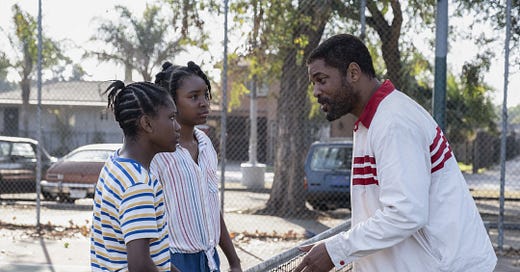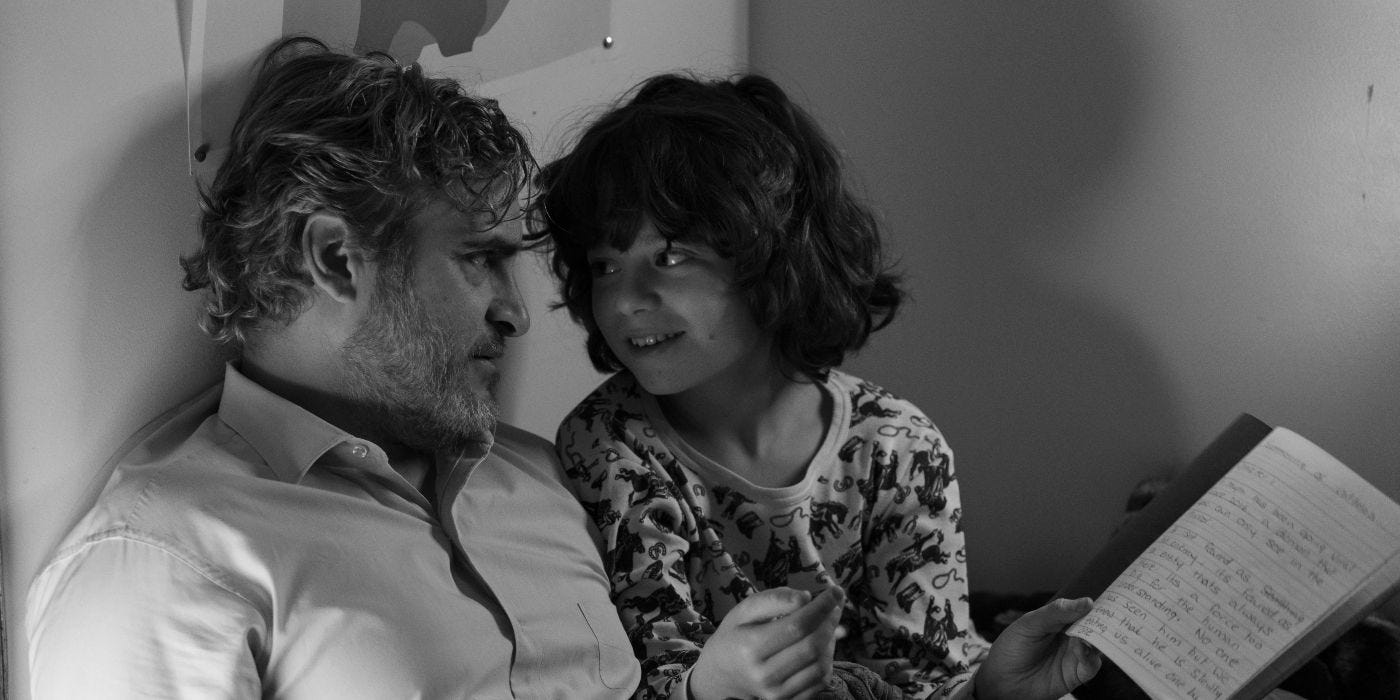It's All Relative
"King Richard" and "C'mon C'mon" give Will Smith and Joaquin Phoenix satisfying roles as men grappling with family responsibilities.
ap
The Nut Graf: “King Richard” (in theaters and on HBO Max) restores Will Smith to his throne in a crowd-pleasing sports drama about Serena and Venus Williams’ dad. (***1/2 stars out of ****). “C’mon C’mon” (in theaters) gives Joaquin Phoenix a lovely change of pace as a man caring for his nephew during a family emergency. (*** stars out of ****)
Among the many pleasures of “King Richard,” which opens in theaters and comes to HBO Max today, is one experienced only by the audience and shared by no one in the movie. At regular intervals throughout the film, Richard Williams (Will Smith) issues proclamations about his teenage daughters’ future to other characters, most of them White. Venus will win Wimbledon five times. Serena will be the greatest female tennis player of all time. Stuff like that. No one believes him, and why should they? “It’s like asking someone to believe you have the next two Mozarts living in your house,” one doubter says. But he did. And Venus did. And Serena is. It all came true. Who knew?
Richard Williams knew. He just didn’t make it easy for anyone, least of all himself. Directed by Reinaldo Marcus Green (“Monsters and Men”) from a script by Zach Baylin, “King Richard” is mostly a giant playpen for Will Smith to reclaim his mojo as this most exuberant and arrogant and difficult of men. Serena and Venus Williams are credited as executive producers, so it’s a family film in more ways than one, but the portraiture comes with just enough warts to make it credible as entertainment if not biography. Richard Williams did it his way, and his way alienated just about everyone at one point or another, including his wife, Oracene (Aunjanue Ellis), and daughters (Demi Singleton as Serena and Saniyya Sidney as Venus). What drove him? According to this movie, an electrified stew of certainty, pride, love, and fury. Serena and Venus were a Southern-born Black man’s dream of revenge on White America, and Williams willed it into reality. This is the ultimate sports-dad movie, the inverse of a nightmare like “Fear Strikes Out” (1957), where Karl Malden drives Anthony Perkins (as Jimmy Piersall of the Boston Red Sox) into a nervous breakdown on the field.
Williams was lucky, though: His daughters had the goods – the talent, the drive, a love of the game. “King Richard” starts in the late 1980s, when the girls are still preadolescents and Richard is drilling them on shabby public courts in Compton, and it takes us up to 1994 and Venus’ first professional match, against Arantxa Sanchez Vicario at the Bank of the West Classic in Oakland, CA. Over and over (and over), we see the father brazen his way into lily-white country clubs and courtsides to pitch his daughters to backers and coaches and then insist against all evidence to the contrary that he knows better than they do when it comes to technique. Tony Goldwyn plays one of the coaches, Paul Cohen, and a very funny Jon Bernthal plays another, Rick Macci, a nervy little hustler who lasted the longest and who just about tears his hair out when Richard announces he’s pulling his daughters off the junior tournament circuit to focus on their studies and home life. (Venus at this point had a 63-0 record.)
I want to say this is Will Smith’s movie – if you care enough about where to place your Best Actor bets, look no further – and without question there’s immense satisfaction to be had in watching Smith find his footing once more as an actor and a star after years of misfired movies and social-media mockery. He never lets us lose sight of the engine propelling Richard forward, the need to grind his daughters’ greatness – which is to say his own – in the face of a racist society. Not to show that they’re as good as White people, but that they’re better.
But “King Richard” is not so secretly a movie about queens – the family of women (including Oracene’s three daughters by an earlier marriage) who function as a warm and loyal support group for each other against the world and more than occasionally against their father. Singleton and Sidney give dynamic performances on the court and incisive ones off, with the former conveying Venus’s steely joy in athleticism and the latter portraying Serena as a quieter and younger talent biding her time, knowing it will come. And I do hope Ellis comes in for her share of awards attention as Oracene Williams, forced to be the steady rudder in a family captained by a monomaniac and in one quietly angry scene reminding her husband that it’s not him on that court but his daughters. Whatever rough edges have been sanded off the real Richard Williams in this telling, it’s still a hell of a story.
“C’mon C’mon” opens in New York and Los Angeles this week and expands to other markets (including Boston) on the 24th. If you get a chance to have a look, do so – the movie’s small, heartfelt, and sweetly wonky in its look at fractured families and the fractured individuals in them. It also features one of the gentlest performances of Joaquin Phoenix’s career as a lonely nice guy – a radio journalist interviewing children and teenagers about their hopes for the future – who’s drafted to care for his sister’s 8-year-old son over a period of several weeks when she has to deal with a family crisis. I came to the movie cold and 20 minutes in thought to myself, “This feels like a Mike Mills movie,” and, sure enough, it’s from the writer-director of “Beginners” (2010) and “20th Century Women” (2016). Very few filmmakers currently working are as good as Mills at showing the invisible webs of love and aggravation that bind families together, especially modern families with their various parts missing or changing midstream.
Christopher Plummer won an Oscar as an elderly dad coming out of the closet in “Beginners,” and Annette Bening should have won an Oscar for the single mom of “20th Century Women.” “C’mon C’mon” is more clearly a three-cornered ensemble piece, with Phoenix graciously sharing screen space and energy with Gaby Hoffman as his sister and especially Woody Norman as the nephew, who comes across not as a movie kid but an actual kid, fractious and funny and sometimes a pain in the ass. There’s not a lot of plot here, but there’s life as we know it and as the movies don’t always bottle it, and that’s enough.
If you enjoyed this edition of Ty Burr’s Watch List, please feel free to share it with friends.
If you’re not a paying subscriber and would like to sign up for additional reviews and to join the discussions, here’s how:
If you’re already a paying subscriber, I thank you for your generous support.







